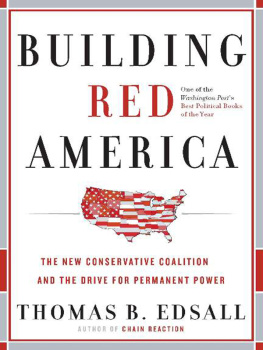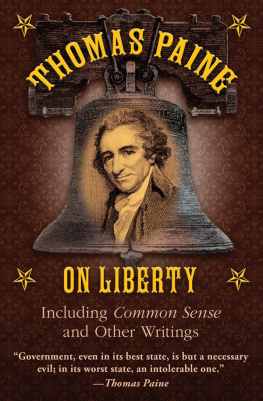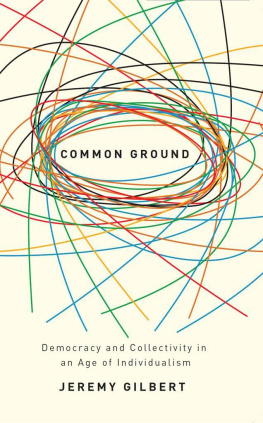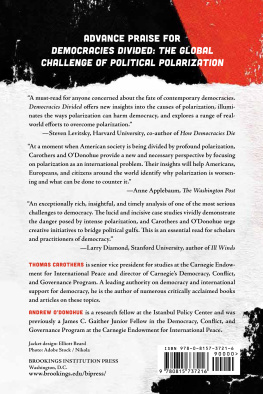For Ken Paulson, USA Today editor, who said yes and made it all possible, and for Brian Gallagher, editorial page editor, and John Siniff, our copy editor, who make the column fit to print and without whose support and encouragement we might not have written this book.
To my children, Alex and Mackenzie, may your generation always seek common ground.
I believe we can find some common ground with the Democrats.
President George W. Bush answering questions at a press conference the day following the 2006 election
Extending the hand of partnership to the presidentnot partisanship, but partnership[I] say lets work together to come to some common ground where we can solve the problem in Iraq.
Politics, it seems to me, for years, or all too long, has been concerned with right or left instead of right or wrong.
Richard Armour, American poet and novelist
I N THE 1994 MIDTERM CONGRESSIONAL ELECTIONS, FOR THE FIRST time in more than forty years, Newt Gingrich led the Republicans to a majority in the House of Representatives. On November 6, 1998, the legendary firebrand from Georgia resigned as Speaker of the House and relinquished his congressional seat. Gingrich had been Speaker for less than four years. He was pushed overboard by the very people he had led to power. In an effort to head off the mutiny, Gingrich placed a call to the House Republican leadership in which he said, I am willing to lead, but I wont allow cannibalism. The cannibals prevailed.
Nine years earlier, on May 31, 1989, another House Speakerthis one a Democratwas forced from office. In his farewell address to the House, Jim Wright of Fort Worth, Texas, urged his colleagues to bring this period of mindless cannibalism to an end. Wright resigned after failing to squelch a relentless ethics campaign concerning allegations that he had received laundered money from organized labor through the sale of a book he had written. In one of political historys great ironies, the campaign to oust Wright was led by Newt Gingrich.
It said much about modern Washington that both Gingrich and Wright invoked cannibalism to describe the process that led to their ouster. Both men had become victims of a climate of political polarization, rooted in the 1960s, which by the late 1980s had decimated bipartisanship in national politics. Wright and Gingrich had contributed to the climate, and it ended up consuming their careers.
Forty-four days after Gingrichs resignation, Republican Bob Livingston of Louisiana, chosen by his fellow Republicans to succeed Gingrich, suddenly announced his resignation from Congress. He, too, had become a victim of the cannibals. In Livingstons case, an extramarital affair with a staff memberwhich had occurred several years before but was about to become publicplaced him in the boiling pot. On that same day, December 19, 1998, the U.S. House of Representatives voted to impeach the forty-third President of the United States, William Jefferson Clinton.
One man who would be instrumental in the effort to oust Newt Gingrich from the Speakers office, and in the impeachment of President Clinton, was Congressman Tom DeLay of Sugarland, Texas. DeLay was the Republican majority leader (a position he reached after Gingrich was sacked), and a former pest exterminator who treated Democrats the way he used to treat roaches. DeLay was an admitted and unapologetic partisan. His relentless efforts to keep House Republicans in a disciplined and partisan mode earned DeLay the nickname the velvet hammer.
On September 28, 2005, DeLay was indicted by a Democratic Texas prosecutor for laundering campaign contributions. House ethics rules forced DeLay to resign as majority leader while under indictment. DeLay was also dogged by stories about his relationship with lobbyist Jack Abramoff, who had pled guilty to conspiracy to bribe members of Congress. After winning the Republican nomination for his contested House seat, DeLay resigned from Congress. His safe Republican district was won by a Democrat in the 2006 general election. The chief proponent of polarization had become another of its victims.
It could be argued that polarization notwithstanding, these politicians got what they deserved. Perhaps, but in each case polarization played a significant role. It was not at all clear that Jim Wrights book sales were illegal, but the campaign against him was so intense that House Democrats began to feel the spillover effect from voters back home. Rather than risk their substantial majority, other Democrats eased Wright out. Similarly, Gingrich was ousted by a cabal of right-wing polarizers, including DeLay, who believed the controversial Gingrich was responsible for Republicans losing House seats in the 1998 election.
Politicians on both sides of the aisle have been pushing the limits of propriety for a very long time. Before the current climate of polarization, these activities, although not condoned, were often ignored. Most players in Washington, including the press, were aware of JFKs sexual escapades, but purposely overlooked them. It is fair to say Bob Livingstons sexual encounters did not reach the excesses of Jack Kennedys.
Bill Clintons behavior was certainly reprehensible. But few political observers believe that his sexual activities would have risen to the level of impeachment were it not for the polarizing climate gripping Congress in the late 1990s.
Tom DeLay was indicted for laundering federal campaign contributions to Texas state legislative races. It was a blatant attempt to add to the GOPs already sizable majorities in the state legislature. DeLay needed more Republican legislators to redraw Texas congressional district lines to favor Republicans in the 2004 election. District lines were not scheduled to be redrawn until after the census in 2010. Would DeLay have tried such a dangerous political move were it not for polarization? Indeed, would Tom DeLay have been the House majority leader without raging polarization? Highly unlikely.
James Q. Wilson, the Ronald Reagan Professor of Public Policy at Pepperdine University, is one of the more sober observers of American public policy. In a February 2006 essay for Commentary magazine, How Divided Are We? Wilson made some observations about the chronic polarization that has overtaken contemporary politics.
Wilson defines polarization as an intense commitment to a candidate, a culture, or an ideology that sets people in one group definitively apart from people in another, rival group. In other words, the goal of polarization is to knock off the other side before they knock you off. In the last twenty-five years, the political graveyard has been gaining residents at an alarming rate. Our man Wilson, academic tone aside, has got the political players right. To paraphrase Wilson: polarization occurs when the opposing camp regards a candidate as not simply wrong, but corrupt and wicked. The assumption is that one side is absolutely right, the other absolutely wrong, and the wrong side deserves to die absolutely.
Before settling on Wilsons definition of polarization, we considered several others, but rejected them as too broad and extreme. In the latter category, one is worth mentioning. In The Paranoid Style in American Politics (1965), Richard Hofstadter wrote, Polarization in its extremity entails the belief that the other side is in thrall to a secret conspiracy that is using devious means to obtain control over society.
In todays vernacular: Liberals control the media, the universities, and Hollywood. These commies use their control to force a radical, godless agenda on all God-loving patriotic Amarrricans, especially kids. Or, Conservatives, working through the religious right and Big Biddness, conspired with their hired neoconservative wing nuts to invade Iraq so the United States and Halliburton could get control of oil.












